Sketch of Public Policy Communion, October 2020
|
2020年10月份國政聯誼會縮影 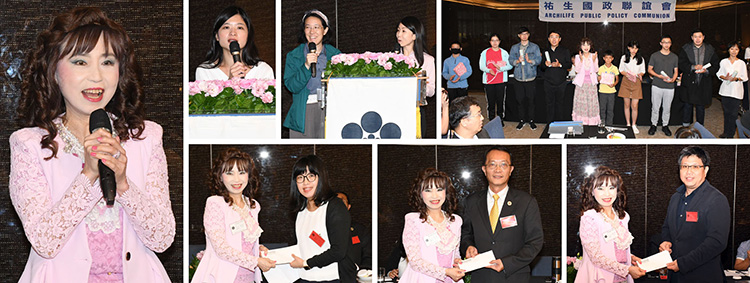 本會於2020年10月18日假喜來登大飯店一樓清翫廳舉行「祐生國政聯誼會」。在主持人黃晉英秘書長宣布後揭開當日活動序幕,在輕鬆、活潑的節目後,隨即由主持人帶來重要訊息:「祐生成員們對於祐生標誌所代表的意涵有所好奇,在詢問林俊興董事長後向大家說明,其中圓與圓之間的切點,象徵著個體生命間串聯的平衡與秩序,維護生命生生不息。然而國際局勢紛紛擾擾,很多人也隨著緊張惶恐,我們應學習解讀資訊背後的意涵,例如美國目前對中國政策,與當年雷根總統對蘇聯手段相似,先消耗其資源,逐漸削弱該國國力,導致蘇聯解體。另外,氣候異變可能導致食物變異,危害人體健康,所以我們應重新審視「食」的安全,保持身體的健康,讓生活過得更好。」 The October Archilife Public Policy Communion of 2020 was held on October 18, 2020. After a series of relaxing and fun activities, Secretary General Huang Chin-ying made the following announcement, "Archilife members have expressed their curiosity regarding the meaning of the Archilife logo. The following explanation is provided after checking with President Lin Chun-shin. The intersection between circles symbolizes how all life is connected to each other, as well as the balance and order that maintains their sustainability. Increased international uncertainty has made people feel more insecure. We should learn how to interpret the implications of available information however. The current US policy on China is similar to the methods used by Presiden Reagan against the Soviet Union. The depletion of resources served to weaken the power of USSR and paved the way to eventual dissolution. At the same time, climate change may lead to food anomalies that threaten human health. We must therefore examine the safety of what we ‘eat’ in order to stay healthy and live a better life." 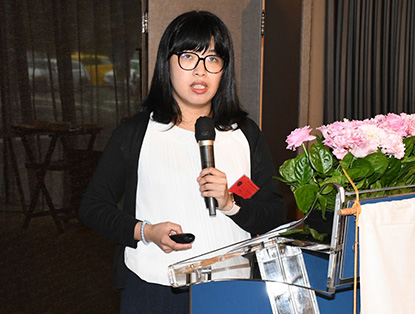 緊接著進行專題演講,由生活特組組長鄭瑋寧小姐進行「生活特組2020年上半年結案報告」。主講人首先表示本階段研討災難類型、監控與調適機制,並強化祐生潛盾計畫中心機能,為垂直遷徙預做準備。氣候異變未來的強度及影響範圍將劇增,應重視災難的預警,並熟稔避難手段及提前部屬。對於各種災難設定預警指標,並研擬對策,採取即時避難行動。氣候異變衝擊生存環境,減緩策略已緩不濟急,必須採取調適策略以保障生命安全。本次也針對周圍地區進行資源調查整合應用,並研擬糧食自給整合方案。主講人也說明了共生緊急避難袋設計與規劃,表示往後將逐一深入探討各項課題,做為實際避難的行動準則。 緊接著進行專題演講,由生活特組組長鄭瑋寧小姐進行「生活特組2020年上半年結案報告」。主講人首先表示本階段研討災難類型、監控與調適機制,並強化祐生潛盾計畫中心機能,為垂直遷徙預做準備。氣候異變未來的強度及影響範圍將劇增,應重視災難的預警,並熟稔避難手段及提前部屬。對於各種災難設定預警指標,並研擬對策,採取即時避難行動。氣候異變衝擊生存環境,減緩策略已緩不濟急,必須採取調適策略以保障生命安全。本次也針對周圍地區進行資源調查整合應用,並研擬糧食自給整合方案。主講人也說明了共生緊急避難袋設計與規劃,表示往後將逐一深入探討各項課題,做為實際避難的行動準則。Next on the schedule was the keynote speech. First, Ms. Cheng Wei-ning, presented a speech on the "Archilife Living Special Team Meeting Implementation Report for the First Half of 2020". The speaker first mentioned that current focus is on types of disasters, monitoring and adaptation mechanisms, as well as strengthening the core functions of the Archilife Sub-Shield Center in preparation for vertical migration. The intensity and scope of climate change will drastically increase in the future. Attention should be paid to early warning of disasters, familiarization with protective measures, and early preparation. Early warning indicators should be set for all types of disasters. Response strategies should also be developed and implemented in a timely manner. The impact of climate change on the living environment means mitigation strategies are no longer adequate. Adaptation strategies must now be adopted to ensure safety. A resource survey was also conducted for the surrounding area this time and an integrated solution for food self-sufficiency has been drawn up. The speaker also explained the design and planning behind the symbiotic evacuation pack, and indicated that each issue will be examined in greater depth in the future to provide guidelines for actual evacuations. 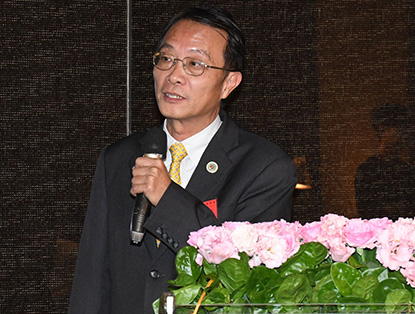 接著由國政會委員林得恩先生主講「氣候異變在台灣」。主講人首先表示近幾年全球各地陸續出現劇烈天災,台灣也不例外,年初經歷了嚴重寒害,造成嚴重農損。依據近百年統計數字,台灣的溫度走向為向上的增溫趨勢,而近十年的斜率更大,增溫更明顯;在降雨部分,總降雨量不變而降雨天數減少,表示降雨強度增加。而今年颱風因太平洋高壓影響皆閃過台灣,也使得史上首次10月夜間離峰時段實施減壓供水。另外反聖嬰現象將延長到年底,將造成今年為寒冬、明年春雨減少。主講人最後感性結語表示,未來可能不再風和日麗、風調雨順,唯有祐生的信念能帶領大家繼續向前。 接著由國政會委員林得恩先生主講「氣候異變在台灣」。主講人首先表示近幾年全球各地陸續出現劇烈天災,台灣也不例外,年初經歷了嚴重寒害,造成嚴重農損。依據近百年統計數字,台灣的溫度走向為向上的增溫趨勢,而近十年的斜率更大,增溫更明顯;在降雨部分,總降雨量不變而降雨天數減少,表示降雨強度增加。而今年颱風因太平洋高壓影響皆閃過台灣,也使得史上首次10月夜間離峰時段實施減壓供水。另外反聖嬰現象將延長到年底,將造成今年為寒冬、明年春雨減少。主講人最後感性結語表示,未來可能不再風和日麗、風調雨順,唯有祐生的信念能帶領大家繼續向前。Next, Mr. Lin De-en spoke on "Climate Change in Taiwan". The speaker first mentioned that the world has been afflicted by severe natural disasters in recent years and Taiwan is no exception. Crops were badly damaged by a cold snap at the start of this year. Records for the last century showed a clear increase in temperature for Taiwan. The magnitude and rate of temperature increase have become even greater in the last decade as well. As for precipitation, total precipitation remaining the same while the number of days with rain decreases meant an increase in intensity of precipitation. High pressure cells in the Pacific meant all the typhoons missed Taiwan this year. As a result, water supply was reduced during off-peak periods at night by lowering the water pressure for the first time in October. The La Nina phenomenon will now run until the end of the year. This is expected to cause a cold winter with less precipitation in spring next year. The speaker concluded with some emotion that the future may not be all good weather and plain sailing. Only the Archilife philosophy will can continue to show everyone the way forward. 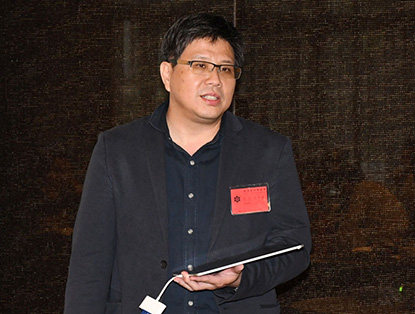 接著由國政會委員李彥頤先生主講「高雄亞灣永續開發推動」。主講人首先提到疫情下海運需求量增加,所以港灣的開發為高雄必須鎖定的課題。主講人也以德國漢堡為例,高雄應對應當地氣候環境因地制宜,以及導入智慧管理監測,並以生物氣候分區來劃定區域開發的原則,以生態景觀格局探討低衝擊開發模式,制定港灣區生態調適設計對策。在微環境氣候部分,做法為把水有效保存提供給綠,達成降溫、減少汙染物、創造有效風廊等目的。主講人表示若能改變傳統的作法,在面對永續的挑戰下,嘗試運用參數化設計得到有效的線索,應能降低環境衝擊,達到良好開發的目的。 接著由國政會委員李彥頤先生主講「高雄亞灣永續開發推動」。主講人首先提到疫情下海運需求量增加,所以港灣的開發為高雄必須鎖定的課題。主講人也以德國漢堡為例,高雄應對應當地氣候環境因地制宜,以及導入智慧管理監測,並以生物氣候分區來劃定區域開發的原則,以生態景觀格局探討低衝擊開發模式,制定港灣區生態調適設計對策。在微環境氣候部分,做法為把水有效保存提供給綠,達成降溫、減少汙染物、創造有效風廊等目的。主講人表示若能改變傳統的作法,在面對永續的挑戰下,嘗試運用參數化設計得到有效的線索,應能降低環境衝擊,達到良好開發的目的。Next, Mr. Li Yen-yi spoke on "Sustainable Development of Asia New Bay Area in Kaohsiung". The speaker first mentioned that the increase in demand for sea freight from the pandemic makes the development of the bay area a key issue for Kaohsiung. Using Hamburg in Germany as an example, the speaker said that Kaohsiung should tailor development to the local climate and environment. Smart management and monitoring should be introduced as well. Regional development should be guided by biological climate zoning and the impact of development reduced through ecological landscaping. A suitable strategy can then be designed for the ecological adaptation of the bay area. To create micro-climates, the effective capture and supply of water for greening helps to lower the temperature, reduce pollutants, and creative effective wind corridors. According to the speaker, if we can make changes to traditional practices and make use of parameterized design when faced with sustainability challenges, this should prove effective leads on how to reduce the environmental impact and achieve sound development. 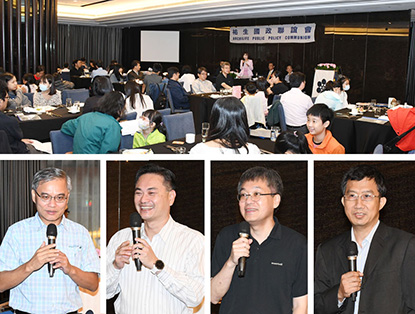 演講完畢,黃晉英秘書長代表基金會致贈謝禮予主講人。接著在與會者紛紛利用「餵豬時間」提出個人意見與看法交流後,圓滿地結束十月份國政聯誼會。 演講完畢,黃晉英秘書長代表基金會致贈謝禮予主講人。接著在與會者紛紛利用「餵豬時間」提出個人意見與看法交流後,圓滿地結束十月份國政聯誼會。After the speech, Secretary General Huang Chin-ying presented a gift to the speakers on behalf of the foundation. Then, attendees expressed and exchanged their opinions and views during the piggy hour. The October Archilife Public Policy Communion ended smoothly. |

